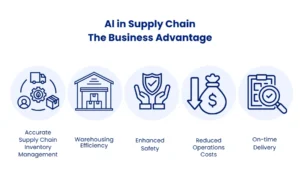The blood and bone of any business are the supply chains, and optimization has never been a more vital issue. With supply chain management becoming more complex and featuring increasing customer expectations in a global environment, artificial intelligence-driven supply chain optimization is enabling firms to keep up. Using AI in logistics and inventory management AI, companies can get real-time data, make better decisions, and deliver goods on time with the use of minimal operational risks. The blog highlights how AI in supply chain is changing the process of supply chain operations, the challenges of adoption, and the daily benefits of AI-based supply chain optimization.
Making Supply Chains AI and Advanced Logistics
The present-day business environment is in a race against time, and optimization of the supply chain has become the go-to factor in remaining competitive. The adoption of AI in Supply Chain Management provides companies with advanced technologies to plan their capacity through the use of more accurate capacity planning and smarter demand forecasting, enhanced productivity, reduced costs of operations and overall output, and safer working conditions.
Therefore, is AI in logistics and inventory management the solution? We will discuss the real-life examples and advantages of AI supply chain optimization that are assisting companies in keeping pace with this fast-growing environment.
Leveraging AI for Smarter Supply Chain Optimization and Inventory Management
Precise Inventory Control through AI
Efficient supply chain optimization starts with precise and intelligent inventory control. The increased complexity of modern supply chains frequently causes the traditional approaches to fail, overstocking, understocking, and unexpected stock-outs, which may cause disruption. Implementing inventory management AI ensures businesses have the right inventory levels at all times, improving flow across warehouses and distribution centers.
Automation and Warehouse Effectiveness
Warehouses are a critical hub in supply chain optimization, and their efficiency directly impacts overall AI in logistics performance. AI-enabled solutions help to maximize the search for items, automate routine tasks, and simplify the complex workflow, which guarantees a smooth process between a warehouse and a sender. Companies are able to spend less time and costs to save a lot of time and money, and order fulfillment will be high since manual labor will be minimized. Moreover, AI can also restructure the warehouse layout dynamically and assign tasks according to demand patterns, which can further enhance the efficiency of operations.
Improved Safety and Compliance
Speed and efficiency are only part of the picture used in AI-driven tools; safety is also improved. Automated systems constantly scan the conditions within the warehouses and safely analyze the data to help identify any possible risks before they become dangerous. Through the use of feedback loops and predictive maintenance, these systems make companies take preventive action so that the workers and materials are safe. Adopting AI in supply chain optimization processes guarantees compliance with safety regulations while fostering a secure and productive workplace.
Reduced Operational Costs
The AI minimizes the costs of operations within the entire supply chain. Robotic solutions minimize the errors of human beings, accidents at the place of work, and allow companies to operate with minimal interruptions. Warehouse robots, AI-managing sorting machines, and automated order receivers increase efficiency and minimize the cost of labor. Through smooth and efficient running of the activities, businesses can enjoy higher profitability and ROI on their investments in the supply chain, which supports supply chain optimization.
Customer Satisfaction and Punctuality
Punctuality is one of the pillars of customer satisfaction, and AI will ensure that this critical commitment is met at all times. Using distribution and warehousing optimization, AI systems remove the bottlenecks and accelerate the processing speed. Higher visibility and real-time tracking will make the businesses deliver quality products at the right time, and this will cement customer loyalty and trust. Inventory management and logistics automation using AI also allow companies to react quickly to unexpected changes in demand, which supports timely deliveries.
Anticipatory Decision-Making Predictive Analytics
The modern supply chains live on vision. The AI uses the power of predictive analytics in the supply chain optimization to predict possible disruptions, like supplier delays, demand variations, or transportation bottlenecks. AI machines provide actionable data that can enable businesses to take proactive actions rather than remedial solutions through their capacity to process previous information and through forecasting. This predictive potential is especially essential to the businesses that are responding to the desire to stay in the AI field of Supply Chain Management excellence and minimize the risks and operational uncertainties.
Efficient Routing and transportation
Transportation is one of the most significant components of a supply chain. Through AI in logistics, companies will be able to streamline the delivery routes, minimise the amount of fuel used, and improve transportation efficiency. Live tracking, intelligent route optimization, and traffic predictions are guaranteed to deliver goods to the destination at the most cost-efficient cost and on time. These strategies, together with AI-driven automation of the warehouse, allow a business to make significant steps towards end-to-end supply chain optimization, guaranteeing it a competitive edge in the current market.
Inventory Forecasting and Demand Planning
Inventory management AI systems can not only follow the levels of current stock but also make predictions of future demand. By analyzing customer purchasing patterns, seasonal trends, and market dynamics, machine learning in supply chain can help companies make informed decisions about production, procurement, and stock replenishment. This guarantees the efficient movement of goods and minimizes the expensive mistakes, improving the efficiency of operations and customer satisfaction.

Overcoming Key Challenges in AI-Driven Supply Chain Optimization
The potential of AI in Supply Chain Management and logistics is enormous, offering unprecedented opportunities for supply chain optimization. Nevertheless, the shift towards an AI-driven supply chain is not necessarily an easy one. Business firms must know the obstacles that they are likely to encounter and strategize to eliminate them.
Shifting through System Complexities
AI systems, especially those deployed for AI in logistics and inventory management, are typically cloud-based and demand significant bandwidth. Also, there are AI solutions that need specific hardware to reach their potential. Although this high technology will enable supply chain optimization to achieve extensive efficiencies, the initial investment in the hardware related to AI can be very high.
Scalability Challenges
Although the majority of AI platforms are scalable by nature, there are usually initial infrastructural and user base requirements to realize meaningful outcomes. Every AI system is distinct, and its efficacy may differ depending on the scale. Companies looking to implement machine learning in supply chain operations must collaborate closely with an AI development company. This is to determine the right setup for their business size, ensuring the system grows seamlessly with operational demands.
Training and Skill Development Costs
The transition to AI technologies is not just the installation of software, but the training of staff. Staff should learn how to engage with AI devices in a way that does not affect their work; it requires time and money. To maximize the use of Artificial Intelligence in the supply chain, it is necessary to develop a complex training program. While this may temporarily impact operational efficiency, well-trained teams ensure long-term gains in productivity, accuracy, and supply chain optimization.
Operation and maintenance costs
AI-driven systems depend on a web of high-performance processors and sensors, all of which must be serviced regularly and sometimes replaced. These operational expenses, such as energy use and system maintenance, may accumulate in the long run. Without proper planning, overhead expenses could rise, impacting the overall ROI of AI in inventory management and other automated supply chain processes.
Information Systems and Data Interaction
The implementation of AI in the current supply chain activities demands the efficient management of massive datasets. The quality of data and the interconnected systems can affect the effectiveness of AI. Companies should also invest in a good data management approach to make predictive analytics in the supply chain optimization provide accurate and actionable information.
Adoption Resistance and Change Management
The shift toward AI-enabled systems may be met with opposition from more traditional-minded employees. To deal with this change, there must be communication, buy-in among the stakeholders, and incentives to adopt. Companies must foster a culture that embraces AI in Supply Chain Management innovations to maximize efficiency and ensure successful implementation.
Daily Advantages of AI-Driven Supply Chain Optimization
The AI strength in Supply Chain Management is reshaping how businesses are conducted. In terms of saving money and minimizing redundancies to eliminate risks, improving delivery time, and streamlining routes, AI is allowing companies to achieve supply chain optimization as never before. The most prominent businesses all over the world are starting to integrate AI into their logistics and inventory management to enhance forecasting, operations management, and customer satisfaction.
According to McKinsey, 61 percent of manufacturing leaders report having reduced costs in their manufacturing, and 53 percent of them have reported increased revenues after implementing AI in their supply chains. Besides, a third of the firms had over 5% revenue growth. The primary areas of AI application with a beneficial effect are in planning and scheduling, predicting, spending analytics, optimization of logistics networks, and inventory management.
Enhancing Planning and Scheduling
Supply chain optimization and scheduling a complex task. The existence of globalization, product diversification, and uncertain demand makes it difficult to ensure that managers have a profitable supply chain. It also makes visibility between product portfolios more challenging because of unexpected situations, such as plant issues, transport, and other disruptions.
Through machine learning applied in supply chain processes, managers are able to detect bottlenecks, predict possible disruptions, and optimize production plans. The use of AI also allows making accurate predictions at various levels and letting the managers plan the best alternatives to be used in case of any interruption, which will also lead to improved optimization of the supply chain.
Intelligent Decision-Making
Artificial intelligence-based platforms enhance decision-making due to their cognitive qualities and suggestions of the best course of action. These systems take into account a wide range of situations, and they assess the effects in terms of time, cost, and revenue. AI supply chain optimization enables continuous learning capability, so that it can adapt to dynamic business environments and make smarter, faster, and more informed decisions.
End-to-End Visibility
The contemporary supply chain is very complex, and total visibility is of the essence. AI offers a centralized platform on which operations can be tracked, bottlenecks identified, and opportunities discovered in real-time. This cognitive approach replaces reliance on outdated historical data with actionable insights, enhancing operational efficiency and overall AI in Supply Chain Management performance.
Practical Analytical Implications
Most organizations find it difficult to derive valuable insights from fragmented and large volumes of supply chain data. AI-based analytics is capable of identifying patterns, quantifying trade-offs, and prioritizing decisions on a large scale. At this level of intelligence, businesses can perform quickly, minimize mistakes, and enhance responsiveness in the supply chain.
Inventory, Demand Management
Balancing inventory levels is one of the most critical aspects of supply chain optimization. Overstocking raises storage expenses, as stock-outs may destroy streams of revenue. AI in inventory management ensures accurate demand forecasting, enabling companies to maintain optimal stock levels. The predictive models will be capable of predicting the life of products, the growth of new products, and the decline of old ones, so that there will be accurate planning on warehouses and distribution centers.
Increasing Operational Efficiencies
The IoT sensors and connected devices produce huge volumes of supply chain data. This data is laborious and resource-intensive to analyze manually. Artificial intelligence in supply chain leverages machine learning algorithms to process real-time information, optimize pricing strategies, and identify efficiencies across operations. This AI implementation provides quantifiable gains in productivity, cost savings, and resource usage.
Unleashing Fleet Management Efficiencies
Fleet management is a sensitive interface between the suppliers as well as the consumers. Fleet operations are complicated by rising fuel prices, workforce limitations, and complicated delivery times. AI-based logistics systems offer real-time tracking and optimal route planning, and predictive intelligence. This reduces downtime, avoids bottlenecks, improves fuel efficiency, and ensures timely deliveries, strengthening overall supply chain optimization.
Enterprise Resource Planning (ERP) simplification
ERP systems can be expensive and complicated, particularly in the case of a global supply chain. The introduction of AI improves the ERP systems, linking individuals, workflows, and data intelligently. AI transforms ERP systems into event-driven technology, which allows taking initiatives, enhancing forecasting, and using data more efficiently. This intelligent integration ensures that the entire supply chain operates smoothly and efficiently, driving continuous AI in Supply Chain Management improvements.
Conclusion:
AI is redefining supply chain optimization, making operations smarter, faster, and more efficient. From precise inventory management and predictive demand forecasting to optimized fleet operations and streamlined ERP systems, AI in Supply Chain Management drives tangible improvements across the entire value chain. Partnering with a trusted AI development companies or leveraging AI development services ensures smooth integration and maximum benefits. To unlock the full potential of Artificial intelligence in supply chain and elevate your business operations, connect with AnavClouds Analytics.ai today and transform the way you manage your supply chain.



